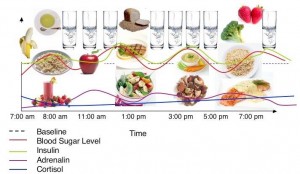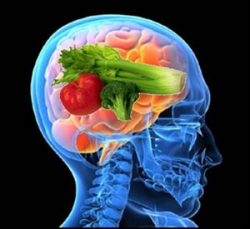“If you think of the brain as an engine, it’s going to run better on high-grade fuel. That’s what a brain-healthy diet provides”.
Paul E. Bendheim, neurologist
 Brain Food
Brain Food
Without enough calories and nutrients, your brain suffers. And with it, your ability to form and create new ideas.
Your brain requires twice as much energy as the rest of your body’s cells. It runs on glucose — a form of sugar reaped from carbohydrates. Since it can’t store glucose, the brain relies on your bloodstream for a steady supply. But that doesn’t mean you should fill up on sugar-laden foods. A brain-healthy diet emphasizes whole foods, such as fruits, vegetables, whole grains, nuts, seeds and fish.
 Create Your Plate
Create Your Plate
Emphasizing nutritious eating is only one part of enhancing creativity. Your overall habits, such as how often you eat, should promote positive hormone and blood sugar levels — factors that make way for stable moods and clear thinking.
This may mean eating three balanced meals and one to three healthy snacks or five or six “mini” meals throughout each day. And most of your meals should contain all three macronutrients: carbohydrates, proteins and fats.
One way to create well-balanced meals is the “plate method.” At each meal, imagine a line drawn down the center of your plate, fill half of it with vegetables, such as spinach and tomatoes, one-quarter with protein, such as grilled salmon — which also contains healthy fat, and the remaining quarter with a healthy starch, like whole wheat pasta or brown rice.
 Common Diet Don’ts That Cramp Creativity
Common Diet Don’ts That Cramp Creativity
Here’s what’s cool: Eating well makes way for a happy, healthy brain. And it isn’t hard. Avoiding these common “don’ts,” choosing primarily healthy foods and not going too long without eating, can boost your brain function, leading to sharper creativity and improved overall health.
1. Dieting.
Roughly half of Americans are dieting at any given time, according to the National Eating Disorders Association, despite the negligible success rate and broad range of complications. Eating too little wreaks havoc on our metabolism and starves our brains. Restrictive diets—including those diet “plans” and “programs” that impose strict rules—can cause foggy thinking, poor concentration, fixation on food and weight-control and memory problems.
 2. Overdoing protein.
2. Overdoing protein.
One macronutrient group Americans tend not to lack is protein. Most of us consume over twice the amount we need, which is around 7 grams for every 20 pounds of body weight. Protein plays an important role in brain function by supplying amino acids—the building blocks of our brains network. They allow for excitability and relaxation, as part of a balanced diet. But going overboard has been linked with brain shrinkage and an increased risk for dementia. It also leaves little room in our diets for brain-energizing foods. And don’t be fooled by the initial weight loss stimulated by high-protein/low-carb diets. It’s typically temporary, unhealthy loss, and our brains and bodies can suffer.
3. Skimping on whole grains.
Our brains rely on carbohydrates more than any other nutrient. Drop too low, and we’re likely to feel sluggish, fatigued, agitated, blah and dulled creatively. Whole grains are among the most nutritious carbohydrate sources on the planet. Many large-scale studies have linked diets rich in whole grains with positive brain function. Sadly, most Americans consumes less than one-third of the recommended servings per day. Whole grains are top sources of brain-boosting nutrients, including B-vitamins, vitamin E, selenium and magnesium. Because they provide more fiber and protein than refined grains, such as white flour, they also provide more staying power for your brain and body between meals. Nutritious examples include brown rice, wild rice, quinoa, oats, spelt, buckwheat, whole wheat and popcorn.
 4. Too few healthy fats—and excessive unhealthy fats.
4. Too few healthy fats—and excessive unhealthy fats.
Our bodies make all the saturated fat we need, which are also found in fried foods, fatty meats and dairy products. And trans-fats, prevalent in hard margarine and commercially-prepared cookies, crackers and other foods containing hydrogenated vegetable oil, can reduce the effects of healthy fats, which are vital for proper brain function. Like protein, most of us are not fat-deficient. But many of us lack healthy fats. For improved brain function, choose cold-water fish, such as salmon, albacore tuna, mackerel and halibut, over fatty steaks most often. Other brain-healthy fat sources include flaxseed, walnuts, soybeans and canola oil.
5. Too few fruits and veggies.
Fruits and vegetables aren’t just great for immune function, healthy skin and weight control. They supply rich amounts of antioxidants, water and fiber—ingredients our brains adore. (Antioxidants help reduce damage from free radicals in the brain, which can interfere with creative processes.) Aim for a variety of fruits and vegetables, and a variety of colors, for best results. Including colorful produce with all of your meals, and snacks as desired, is a great way to meet your daily needs. Particularly brain-healthy varieties include berries, plums, citrus fruits, tomatoes, artichokes, dark leafy greens, carrots and sweet potatoes.
 6. Overdoing alcohol.
6. Overdoing alcohol.
We may feel hilarious, smart and savvy while boozing it up. Most of us know that’s largely drunkenness speaking. Studies have shown that the more alcohol we drink, the more likely we are to experience severe sleep problems, daytime grogginess and reduced cognitive function. And even moderate alcohol consumption has been linked with brain shrinkage over time. If you enjoy alcohol, aim for moderate and occasional almost rare indulgences and NO CARBONATED BEVERAGES !
A Sample Brain-Healthy Day
- Breakfast: Steel-cut oatmeal, organic or Greek yogurt, fresh fruit and ground flaxseed or walnuts
- Lunch: Large veggie salad with balsamic vinaigrette, grilled salmon, 100 percent whole grain roll
- Snack: Baby carrots with healthy dip and/or apple slices with almond butter
- Dinner: Steamed or grilled veggies, brown rice, vegetarian chili or grilled tofu
- Dessert/Snack: Dark chocolate-dipped berries with a glass of low-fat milk
Source:


